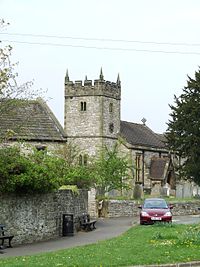Ashford-in-the-Water
| Ashford-in-the-Water | |
|---|---|
 The parish church of the Holy Trinity |
|
| Ashford-in-the-Water shown within Derbyshire | |
| Population | 559 (2011) |
| OS grid reference | SK194697 |
| District | |
| Shire county | |
| Region | |
| Country | England |
| Sovereign state | United Kingdom |
| Post town | BAKEWELL |
| Postcode district | DE45 |
| Police | Derbyshire |
| Fire | Derbyshire |
| Ambulance | East Midlands |
| EU Parliament | East Midlands |
| UK Parliament | |
Ashford-in-the-Water is a village in the Derbyshire Peak District, England, and on the River Wye. It is known for the quarrying of Ashford Black Marble (a form of limestone), and for the maidens' garlands made to mark the deaths of virgins in the village until 1801. Some of these are preserved in the parish church. The civil parish population (including Sheldon) taken at the 2011 Census was 559.
The name Ashford derives from the Old English æsc and ford, and means a ford where ash-trees grow. In 926 the village was known as Æscforda and in the Domesday Book of 1086 it was Aisseford. The addition of "in-the-Water" occurred in the late 17th century, and reflected the proximity of the village to meanders of the River Wye.
In the Domesday Book Ashford was described as one of the locations in the area where lead was refined.
The village passed to the Cavendish family in the 16th century (from the Nevilles) and finally sold off in the 1950s to pay death duties.
The tradition of well-dressing continues in Ashford as in many other villages in the Peak District. Each year slabs of clay are decorated by village volunteers using petals, leaves and other plants to create a picture. The finished designs are then displayed at the six wells around the village and the event is marked by a church service and precession through the village to bless the wells. The event takes place around Trinity Sunday.
The village is bypassed by the A6 road.
Within Ashford's civil parish are 62 structures that are listed by Historic England for their historic or architectural interest. None is listed as Grade I but there are two structures (Ashford Hall and the Sheepwash Bridge) that are Grade II*. All the others, including Thornbridge Hall and the parish church, are Grade II.
...
Wikipedia

